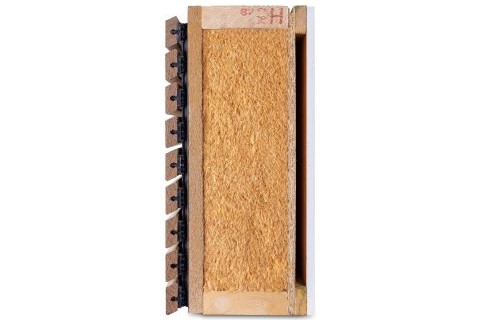
Durable timber-frame renovation
Show productsAt Carpentier, we have redesigned construction methods by building timber-frame walls for house renovations off site. Our timber-frame home extensions and walls meet the latest standards and come with eco-friendly insulation and a choice of cladding including wood or bricks. They are also fully compatible with other construction methods.
Renovation possibilities thanks to timber-frame construction
In order for the EU to become climate neutral by 2050 and meet energy performance requirements for buildings (EPB), many buildings must become more energy efficient. But how can you renovate your house to meet these requirements? Timber-frame renovation is the answer! Our timber-frame walls are self-supporting and perfectly compatible with all construction methods.
Timber-frame external walls
Better façade insulation results in a more energy-efficient house or building. And to do this as quickly, efficiently and impeccably as possible, timber-frame external walls could be the perfect solution. Your new façade is entirely prefabricated in our workshops. We fit the timber-frame external walls with eco-insulation that meets insulation standards set in the European Green Deal. So this ensures you a long-term solution
Another advantage: Carpentier can supply your choice of cladding directly. So you instantly get the look you wanted.


Good to know
As an entrepreneur, you will make savings on transport and scaffolding costs. You don’t need scaffolding to erect and finish a timber-frame façade. It’s the ideal solution for busy or cramped building sites.
Home extensions
Do you want to enlarge an existing house in a sustainable and circular way? In that case, a timber-frame renovation is the ideal building method for you. We prefabricate all the elements in our workshop and fit them with the insulation needed. Find out more about the possibilities for a timber-frame storey or upward extension or take a look at our wooden outbuildings, available in timber-frame.


Why a timber-frame renovation?
As you perhaps know, timber-frame construction is an alternative to traditional building methods that offers many advantages:
- Saving space: timber-frame walls are thinner so you end up with more space indoors. You also don’t need as much space on the building site. You don’t have to have scaffolding in place for weeks on end and the walls are not stored on the building site for nearly as long.
- Saving time: timber-frame construction is faster than building with bricks. Everything is prefabricated in our workshop so weather conditions have no impact on building site progress and the margin of error is greatly reduced. This efficient production method means the construction process takes much less time, so people can move in or start collecting rents much sooner.
- Insulation that meets the latest standards: we fit eco-friendly insulation that meets current standards in the workshop.
- Sustainable and circular: timber-frame construction is an environmentally-friendly building method. The wood used grows again naturally and CO2 emissions are much lower since transport can be done in one go.
Eco-insulation
At Carpentier, we prefer to use eco-friendly insulation, such as wood fibre or hemp. This eco-insulation is made up of natural materials, and contributes to the circular nature of timber-frame construction.
Another advantage of this bio-based insulation is it keeps a house warm in winter and cool in summer. Wood fibre, for instance, keeps heat out for three times as long in summer which can make an 8°C difference indoors. So environmentally-friendly insulation offers more comfort.
European directives
The EU is aiming to be climate-neutral by 2050. To achieve this goal, Brussels has issued numerous directives. One of these covers the energy efficiency of buildings. A Eurostat study showed that our buildings are responsible for 40% of total energy consumption. That is why the European Commission wants to:
- Make member states renovate at least 3% of public buildings every year;
- Increase renewable energy in the buildings sector to 49% by 2030;
- Require member states to increase the share of renewable energy used in heating and air conditioning by 1% per year.
It was also stated that the current renovation rate needs to at least double to meet targets.
